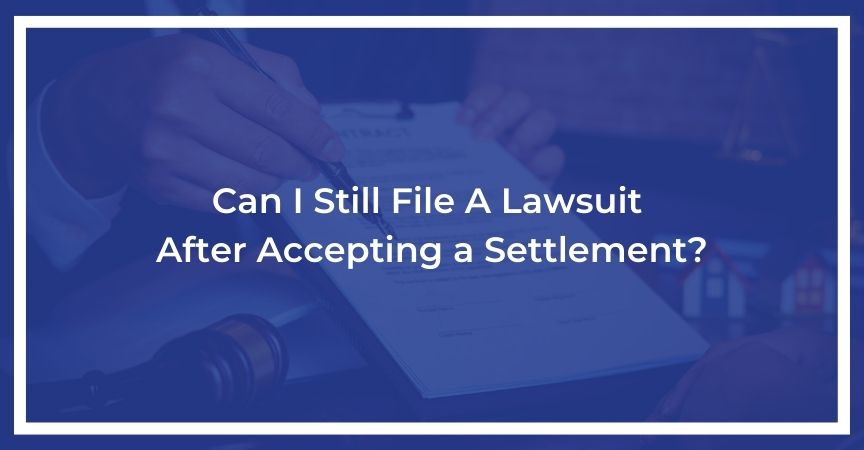The aftermath of a serious injury can be physically, emotionally, and financially difficult. You may suffer from chronic pain, lose significant amounts of wages during your recovery period, and struggle with expensive medical bills for necessary treatments. In these situations, it can be tempting to accept a settlement as soon as possible — but if the settlement is not sufficient enough to help you recover, can you still file a lawsuit?
Settlements versus Lawsuits: What’s the Difference?
Before discussing whether or not you can file a lawsuit after accepting a settlement, it is crucial to understand the difference between these types of agreements.
A settlement is a private agreement to pay you an agreed-upon sum of money following an accident caused by the person that the entity authorizing the settlement represents. Typically, an insurance company offers a settlement after you file an insurance claim, or, in some cases, following negotiations with you and your attorney. Settlements from insurance companies may be quite lower than what you could claim in a lawsuit unless your attorney argues otherwise, but you can usually obtain the money much faster than you could in a lawsuit.
A lawsuit, on the other hand, is an action that you file in civil court against the at-fault party responsible for your injuries. You and your attorney will present your case in front of a judge and jury, establishing the liability of the other person and presenting evidence that details your physical, financial, and emotional losses. The court will decide whether or not the other person was at-fault, and may award you a settlement based on the damages you claim. The lawsuit process can be long and complex, but you have a greater opportunity to claim the maximum compensation you need to recover through this avenue.
You Cannot Accept a Settlement and File a Lawsuit
When you accept a settlement, you usually waive your right to pursue additional legal action against the at-fault party in your case. The insurance company will typically include a release of liability in your settlement paperwork, which prevents you from filing a lawsuit over the same incident.
However, you can back out of a settlement and pursue legal action before you sign the paperwork. Your attorney may evaluate the offer and determine that the funds are insufficient to pay for your injuries. You also have a greater opportunity to present evidence for a higher settlement in the courtroom, which may result in a larger amount of compensation. There are situations where a settlement prior to trial would be more beneficial than a lawsuit — your attorney will advise you on the best course of action for your case.
Should You Accept a Settlement After an Accident?
If you are suffering from the aftermath of a serious accident, an insurance company representative will likely contact you and ask you a series of questions about the incident. He or she may offer you a settlement soon after discussing your injuries, and it may be tempting to sign this document instead of entering into lengthy trials and negotiations.
However, the funds the company may provide might not be enough to help you recover from your injuries. You may not know the extent of your damages at that point, and signing an early settlement can decrease your chances of obtaining the funds you need.
Accidents and injuries can lead to significant expenses, from medical bills to lost wages to property damage and more. To ensure that you receive the amount of compensation to recover from your accident, contact a personal injury attorney as soon as possible following the incident. Your Bakersfield car accident attorney will be able to evaluate any settlement offers you receive, help you determine the damages you are eligible for, and advocate for your needs from the negotiating table to the courtroom.
